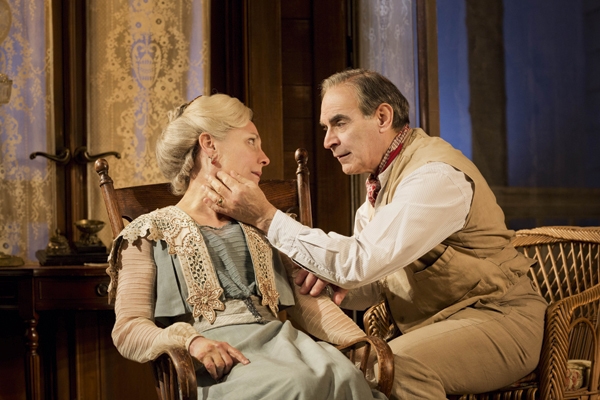Great title, Long Day’s Journey into Night. The sombre, majestic words are suffused with auguries of doom. ‘A play of old sorrow written in tears and blood,’ was O’Neill’s description of the script, which is inspired by his personal background. We’re in a beautiful seaside mansion where a prosperous New York family, the Tyrones, are living in great splendour. But beneath the gorgeous surface everything’s going to hell. The oldest son is a washed-up actor who can’t keep away from the local knocking-shop. The younger boy, a preppie drifter, keeps coughing TB spores into his hankie. The mother, still grieving for a lost child, is hooked on morphine. And the whisky-soaked dad is a millionaire who can’t bear to switch on a spare light bulb. ‘Are we giving a ball?’ he shouts at anyone who turns on the overhead lamp.
We spend 18 punishing hours in the company of these champion bickerers. The tone never varies. Defeat pervades every word and every gesture. Even the climate seems to have caught a dose of Irish–American misery. The desolate lowing of a foghorn resounds across the mist-bound shoreline like the death moan of a stricken elephant. O’Neill’s script brims with symbols and portents. ‘O how thick the fog is,’ says mum as she peers through the window at a pea-souper, ‘and I can’t even see the road.’ She’s talking about her life, of course, not the prospects for a nice walk.
There’s no plot, just a lot of bad family history dredged up and slung around in great gobbets of eloquent venom. O’Neill’s technique soon gets repetitive. He arranges each scene like a rigged boxing match. Two characters are brought together, and one hoses down the other with bucketfuls of acidic hostility which climaxes in some blurted-out family indiscretion. The blurter-out, instantly regretful, pleads forgiveness and adopts a pose of craven remorse that soon wears off and triggers another cycle of resentment and revelation.
These whopping slabs of overheated abuse make audiences yawn. But they have the opposite effect on actors. They bring actors to life. Every luvvie who ever went to Star School has dreamed of laying on an epic O’Neill meltdown in front of a thousand devotees. The speeches are great feats of dramatic literature, crammed with raw emotion, and often requiring rapid shifts of mood in the space of a phrase or two. Actors adore that kind of challenge. And because O’Neill’s plays are extremely long, with small casts, each performer gets at least two or three opportunities to fire off a mag-clip of toxic rhetoric. That’s the key to O’Neill’s exaggerated reputation.
Anthony Page’s good-looking production is easy to admire. The cast throw themselves into it with enormous verve. David Suchet manages to make us understand, and perhaps even to like, the hideous old skinflint James Tyrone, who refuses to pay for a private hospital for his dying son. Laurie Metcalf, as his wife, is tremulous, elegant, snowy-haired and lovely-looking. Her character is concocted from winsome fantasies, like a spare widow out of Ibsen, and she blunders around in her nightie, zonked on opium, wringing her arthritic hands, and burbling about her two lost careers as a nun and a concert pianist. It’s a pretty zany portrait of grief and lunacy and Metcalf just about makes sense of it all. Throughout the play, the crowd listened attentively, coughing very little, and applauding dutifully at the end. But no one stood up. These are the infallible signs of an audience absorbed but not enraptured.
At the Lyric there’s a touring production of Oedipussy by Spymonkey, a quartet of actors all nearing 50. Spymonkey have realised they’re not much good at performing but they’ve decided to carry on anyway. And to demonstrate their ability to laugh in the face of criticism they begin by reading out a lethal review of one of their Edinburgh shows. This lends weight to the suspicion that Spymonkey aren’t actors but outpatients suffering from exhibitionism mania.
They launch into Sophocles’ masterpiece without art or wit, racing through the plot at breakneck speed, and adding lots of lewdness, tedious puns and silly business with silly costumes. Frivolity was never such hard work. Yet Spymonkey appear to be successful. They tour constantly, usually to the provinces of the provinces: Calgary, Houston, Maine, Melbourne. Here they visit Brighton and Lancaster. Are they being invited to these places or have they simply learned how to keep ahead of the eviction posse?
I should mention that kids in the audience found the show’s slapdash ribaldry and ramshackle histrionics rather refreshing. But by my reckoning there’s only one dramatic challenge left for Spymonkey: how to empty a theatre faster than a fire alarm. And when they find that out they’ll start boasting about it.







Comments